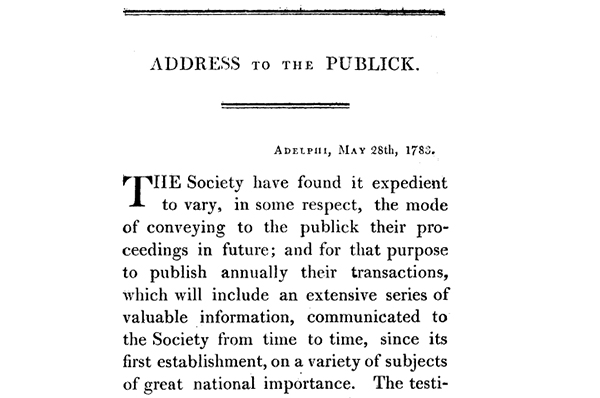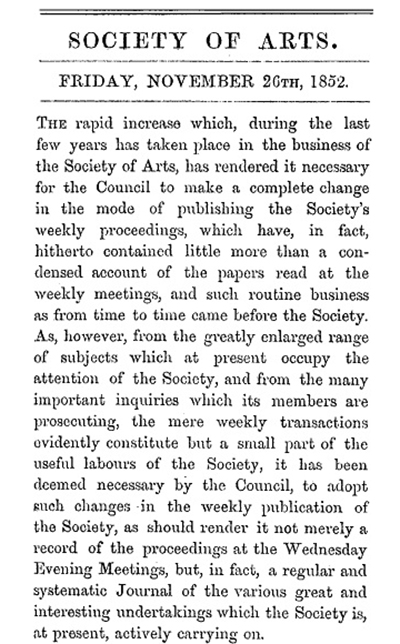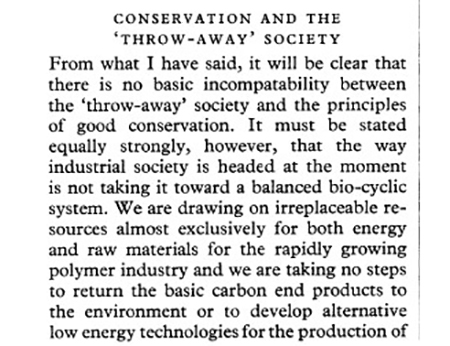It is easier to share or exchange information with a mass audience now than ever before. In fact, there are now more daily active users on Facebook (c.1bn) than there were people on the planet when the RSA was founded in 1754 (c.770mn). Once upon a time, if we wanted to keep in touch or spread ideas, we would send a handwritten letter or be published in a newspaper. We didn’t have the likes of email, Facebook, Twitter, Instagram, Periscope or LinkedIn (and the rest).
Ironically, with the increase in media platforms at our disposal it could be argued that reaching a mass audience is easier, but actually communicating is much more difficult. How can your Tweet be heard above the other 500mn sent every day?
The RSA was founded as the Royal Society for the encouragement of Arts, Manufactures and Commerce over two and a half centuries ago. Ever since then, the RSA has aimed to improve the way the world works and help the people in it. Offering ‘premiums and bounties’ through awards schemes, the RSA allowed designers, artists, and innovators to help solve the social problems of the time. This approach led to the implementation of designs like the lifeboat and the plough, and more recently, advocating for the self-employed, encouraging creativity within the education system, and developing community strategies across the country.
With such a plethora of innovations and ideas, it’s the RSA Journal that has continued to be the method of capture and communication. With its first publication back in 1754, and initially published as a ‘transactions’, they existed to keep the public up to date on current work and to provide a list of the premiums offered throughout the year. As stated in the first RSA Transaction:

“The Society have found it expedient to vary, in some respect, the mode of conveying to the publick their proceedings in the future; and for that purpose to publish annually their transactions, which will include and extensive series of valuable information, communicated to the Society from time to time, since its first establishment on a variety of subjects of great national importance"[1]
It wasn’t until 1852 that the Journal became what we know it as today.

“The rapid increase which, during the last few years has taken place in the business of the Society of Arts, has rendered it necessary for the Council to make a complete change in the mode of publishing the Society's weekly proceedings…the mere weekly transactions evidently constitute but a small part of the useful labours of the Society, it has been deemed necessary by the Council, to adopt such changes in the weekly publication of the Society, as should render it not merely a record of the proceedings at the Wednesday Evening Meetings, but, in fact, a regular and systematic Journal of the various great and interesting undertakings which the Society is, at present, actively carrying on.”[2]
The RSA’s focus over the years may have changed, but the Journals remain as a reflection of the social needs and mindset of both society and the RSA. More importantly, common themes have threaded their way through our journals over the years, with discussions around Creative Learning and Development, Public Services and Communities, and Economy, Enterprise and Manufacture dating back to the very earliest journals.
"The Circular Economy is one of the RSA’s key recent projects, but the concept of creating an economy based on reusable products has been discussed in multiple journals as far back as 1974:

"From what I have said, it will be clear that there is no basic incompatibility between the ‘throw-away’ society and the principles of good conversation. It must be stated equally strongly, however, that the way industrial society is headed at the moment is not taking it toward a balanced bio-cyclic system. We are drawing on irreplaceable resources almost exclusively for both energy and raw materials for the rapidly growing polymer industry and we are taking no steps to return the basic carbon end products to the environment or to develop alternative low energy technologies…"[3]
Methods of communication have changed dramatically over the years, and in these days of social media, we no longer think twice about getting our voices heard. A simple Tweet, email or video can ‘go viral’, being seen by 100mn people in a matter of days.
To put things in perspective, the Journal is over 200 years older than the internet, which became available to the general public around 1990. Yet, despite the increase in the ways we communicate, the Journal is still impactful and remains one of the RSA’s most valued and consistent methods of communication between its Fellows and supporters.
At the end of the day no one puts their Tweets on a coffee table, do they.
Take a look at the download to see how our Journal has changed over the years.
If you want to be an active part of the RSA story, get involved. You can access our past journals and archives via the website.
[1] More, S.. (1783). ADDRESS TO THE PUBLICK. Transactions of the Society, Instituted at London, for the Encouragement of Arts, Manufactures, and Commerce, 1, iii–iiv. Retrieved from http://www.jstor.org/stable/41321870
[2] Stansbury, C. F., Barkly, H., Campbell, W. H., J. M. G., H. S., & Farthing, J. J.. (1852). Journal of the Society for Arts, Vol. 1, no. 1. The Journal of the Society of Arts, 1(1), 1–12. Retrieved from http://www.jstor.org/stable/41334383
[3] The Circular Economy - SCOTT, G.. (1974). PACKAGING AND THE 'THROW-AWAY' SOCIETY. Journal of the Royal Society of Arts, 122(5212), 188–202. Retrieved from http://www.jstor.org/stable/41371221
Related articles
-
Our system of honours
Martin Matthews
Over the last thousand years our society has evolved how we honour individuals. Is it that time again? FRSA Martin Matthews explores current perceptions of the honours system and suggests why reform is long overdue.
-
Standing on the shoulders of Giants:- Plaques commemorating and creating for writers warning about war
Neil McLennan FRSA
In 1867 the RSA instigated the commemorative plaque scheme as a way or recognising places linked with figures from history. In 2018 RSA Fellow and Fellowship Councillor Neil McLennan instigated a series of commemorations to mark Scotland’s Great War poets. Now he calls on more fellows to mark people from the past in places of significance to them, especially in this, the year when peace should be commemorated.
-
Of Markets and Militaries
Kevin Albertson
“Only when the last tree has died and the last river been poisoned and the last fish been caught will we realise we cannot eat money"


Join the discussion
Comments
Please login to post a comment or reply
Don't have an account? Click here to register.
PACKAGING AND THE 'THROW-AWAY, can we make new functional product with these ?
Nick